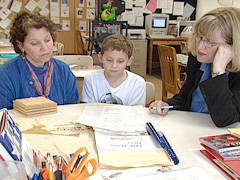Why Is Assessment Important?
Asking students to demonstrate their understanding of the subject matter is critical to the learning process; it is essential to evaluate whether the educational goals and standards of the lessons are being met.
Assessment is an integral part of instruction, as it determines whether or not the goals of education are being met. Assessment affects decisions about grades, placement, advancement, instructional needs, curriculum, and, in some cases, funding. Assessment inspire us to ask these hard questions: "Are we teaching what we think we are teaching?" "Are students learning what they are supposed to be learning?" "Is there a way to teach the subject better, thereby promoting better learning?"
Today's students need to know not only the basic reading and arithmetic skills, but also skills that will allow them to face a world that is continually changing. They must be able to think critically, to analyze, and to make inferences. Changes in the skills base and knowledge our students need require new learning goals; these new learning goals change the relationship between assessment and instruction. Teachers need to take an active role in making decisions about the purpose of assessment and the content that is being assessed.

Grant Wiggins, a nationally recognized assessment expert, shared his thoughts on performance assessments, standardized tests, and more in an Edutopia.org interview. Read his answers to the following questions from the interview and reflect on his ideas:
- What distinction do you make between 'testing' and 'assessment'?
- Why is it important that teachers consider assessment before they begin planning lessons or projects?
- Standardized tests, such as the SAT, are used by schools as a predictor of a student's future success. Is this a valid use of these tests?
Do you agree with his statements? Why or why not? Discuss your opinions with your peers.
When assessment works best, it does the following:
Provides diagnostic feedback- What is the student's knowledge base?
- What is the student's performance base?
- What are the student's needs?
- What has to be taught?
- What performance demonstrates understanding?
- What performance demonstrates knowledge?
- What performance demonstrates mastery?
- How is the student doing?
- What teaching methods or approaches are most effective?
- What changes or modifications to a lesson are needed to help the student?
- What has the student learned?
- Can the student talk about the new knowledge?
- Can the student demonstrate and use the new skills in other projects?
For student self-evaluation:
- Now that I'm in charge of my learning, how am I doing?
- Now that I know how I'm doing, how can I do better?
- What else would I like to learn?
- What is working for the students?
- What can I do to help the students more?
- In what direction should we go next?
Continue to the next section of the guide, Types of Assessment.